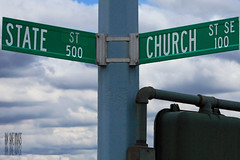AP Supreme Court Cases Flashcards
Terms : Hide Images [1]
| 11407438735 | Marbury v. Madison (1803) | This case established judicial review while arguments about federal judgeships were heard. |  | 0 |
| 11407451364 | McCulloch v. Maryland (1819) | A case regarding taxing a federal bank established the supremacy clause and upheld the necessary and proper clause. |  | 1 |
| 11407462427 | U.S. v. Nixon (1974) | Presidential "Executive Privilege" is not unlimited. Must obey Congressional Subpoenas. |  | 2 |
| 11407470382 | Schenk v. US (1919) | In this case about the 1st Amendment (speaking out against WWI), the Supreme Court established the "clear and present danger" doctrine limiting speech. |  | 3 |
| 11407477226 | Gitlow v. New York (1925) | In a case dealing with a known anarchist (speaking out against the government), the Supreme Court incorporated the 1st amendment to the states using the equal protection clause in the 14th amendment. |  | 4 |
| 11407488316 | Korematso v. US (1944) | This case upheld the decision to Intern (imprison) Japanese Americans without trials. | 5 | |
| 11407495283 | Roe v. Wade (1973) | The Court held that a woman's right to an abortion fell within the right to privacy protected by the 14th Amendment. |  | 6 |
| 11407503797 | Mapp v. Ohio (1961) | This 4th amendment case reinforces the "exclusionary rule" which allows evidence to be excluded from a trail if the evidence was collected unlawfully. |  | 7 |
| 11407541529 | Baker v. Carr (1962) | This case about redistricting political boundaries in Tennessee helped establish the "one person, one vote" rule. |  | 8 |
| 11407565668 | Engel v. Vitale (1962) | Organized daily school prayer led by school officials in public schools violates the 1st amendment. |  | 9 |
| 11407568410 | Gideon v. Wainwright (1963) | The ruling in this 6th amendment case guarantees all people (whether you can afford it or not) an attorney in criminal cases |  | 10 |
| 11407592995 | Miranda v. Arizona (1966) | Established the rule that requires law enforcement agents to tell all accused criminals of their 5th amendment rights. |  | 11 |
| 11407602465 | Wallace v. Jaffree (1985) | Moment of silence for religious purpose during the school day is a violation of the 1st Amendment Establishment Clause. |  | 12 |
| 11407623616 | U.C. Regents v. Bakke (1978) | Upheld affirmative action allowing for race to be ONE of several factors in college admission. |  | 13 |
| 11407631011 | Texas v. Johnson (1989) | This case involving the burning of a flag established that this act is protected by the 1st Amendment as symbolic speech. |  | 14 |
| 11407638581 | Planned Parenthood v. Casey (1992) | Arguments in this case involved the constitutionality of the Pennsylvania Abortion Control Act. Upheld reasonable restriction i.e. waiting periods, parental consent, counseling, etc. |  | 15 |
| 11407657691 | Lawrence v. Texas (2003) | The Court ruled that under the Due Process Clause adults are granted the liberty to engage in private conduct (sodomy). |  | 16 |
| 11407666323 | Heller v. District of Columbia | The 2nd Amendment guarantees an individual's right to possess a firearm to use for traditionally lawful purposes, such as self-defense within the home. |  | 17 |
| 11407681855 | Citizens United v. Federal Election Commission (2010) | Ruled that individuals, corporations, and unions could donate unlimited amounts of money to groups that make independent political expenditures. |  | 18 |
| 11407697909 | Gibbons v. Ogden (1824) | Granted Congress the power to regulate commerce via the Commerce Clause of the US Constitution |  | 19 |
| 11407711319 | Plessy v. Ferguson (1896) | Established the separate but equal doctrine. Allowing "Jim Crow" Laws. |  | 20 |
| 11421876809 | Griswold v. Connecticut (1965) | The Court ruled a law which prohibited using any medicinal article to prevent conception unconstitutional on grounds that it violated the RIGHT TO PRIVACY (which is not directly referred to in the Constitution). |  | 21 |
| 11421895522 | Sheppard v. Maxwell (1966) | The right to a fair trial (6th Amend.) more important than 1st Amendment freedom of the press. |  | 22 |
| 11421905445 | Furman v. Georgia (1972) | State death penalties (as then applied) are arbitrary and violate equal protection of 14th Amendment. |  | 23 |
| 11421934057 | Tinker v. Des Moines (1969) | Students wearing black armbands in protest was held to be protected speech. |  | 24 |
| 11421942265 | Miller v. California (1973) | This 1st Amendment case the court contended that obscene materials are not protected speech based on "contemporary community standards" 3 pronged test |  | 25 |
| 11421962312 | Brown v. Board of Education (1954) | Ended segregation and the use of the "Separate but Equal" doctrine. |  | 26 |
| 11421972499 | Buckley v. Valeo (1976) | 1st Amendment protects campaign spending; legislatures can limit contributions, but not how much one spends of his own money on campaigns. Limits potentially violating the 1st Amendment freedom of speech. |  | 27 |
| 11421986976 | Webster v. Reproductive Health Services (1989) | Supreme Court ruling that upheld the authority of state governments to limit the use of public funds and facilities for abortions. The Court upheld a Missouri law that imposed restrictions on the use of state funds, facilities, and employees in performing, assisting with, or counseling on abortions. |  | 28 |
| 11422463702 | Barron v. Baltimore | The Court decided the Constitution (5th Amend.) did not protect individuals from States (at that time (1833). 14th Amendment (1868) would change this decision. |  | 29 |
| 11422490650 | Near v. Minnesota (1931) | This case involved a "gag law" which punished those who created a public nuisance by publishing malicious and defamatory newspapers. The Court ruled that it was a violation of the 1st Amendment. (Prior Restraint) |  | 30 |
| 11422516405 | Heart of Atlanta Motel v. US (1964) | Congress has the right the prohibit racial discrimination in places of public accommodation through the Commerce Clause because the interstate movement of people is "commerce." Even if the public accommodation is of a purely "local" character, Upheld the Civil Rights Act of 1964 using the Commerce Clause. Desegregated local/state motels. |  | 31 |
| 11422538291 | NY Times v. Sullivan (1964) | In this freedom of the press case, the Supreme Court created a new standard for libel in which actual malice must be proven. |  | 32 |
| 11422553644 | Lemon v. Kurtzman (1971) | Allowed states to provide textbooks and busing to students attending private religious schools. Established 3-part test to determine if establishment clause is violated: nonsecular purpose, advances/inhibits religion, excessive entanglement with government. |  | 33 |
| 11422591636 | NY Times v. US (Pentagon Papers) (1971) | This case involved an attempt to prevent classified information to be printed in an article and an argument that Prior Restraint violates the 1st Amendment.. Court ruled that stopping publication was unconstitutional and not a threat to national security. |  | 34 |
| 11422625845 | Wisconsin v. Yoder | In this Free Exercise case the Supreme Court held that an Amish parents' right to not send their children to school after 8th grade (due to religious beliefs) outweighed a state's interest in educating children passed 8th grade. |  | 35 |
| 11422657748 | New Jersey v. TLO (1985) | Supreme court case in which it was decided that a student may be searched if there is "reasonable ground" for doing so. The Court upheld the constitutionality of a search of a public high school student for contraband. |  | 36 |
| 11422677706 | Hazelwood School District v. Kuhlmeier (1988) | This case involved a school newspaper and the principals desire to omit articled deemed to be inappropriate. Principals have editorial control. |  | 37 |
| 11422715948 | Oregon v. Smith (1990) | This case dealt with the question regarding unemployment benefits to a worker who was fired for using illegal drugs for a religious purpose. States can hold people accountable for illegal act even for religious purposes. |  | 38 |
| 11422740981 | U.S. v. Lopez (1995) | A case involving the commerce clause, Gun-Free School Zone Act, and a 12th grade student carrying a gun onto campus. Law ruled unconstitutional because it couldn't be reasonably tied to Commerce Clause. |  | 39 |
| 11422753152 | Gratz v. Bollinger (2003) | The University of Michigan used a policy to admit virtually all qualified applicants who are members of one of three select racial minority groups - African Americans, Hispanics, and Native Americans (all considered to be "underrepresented" on the campus) Ruled Unconstitutional |  | 40 |
| 11422844082 | Reynolds v. United States | In this case involving the free exercise clause, the Supreme Court held that a statute can punish criminal activity without regard to religious beliefs (polygamy). |  | 41 |
